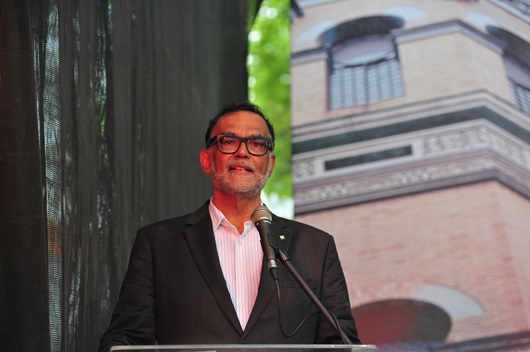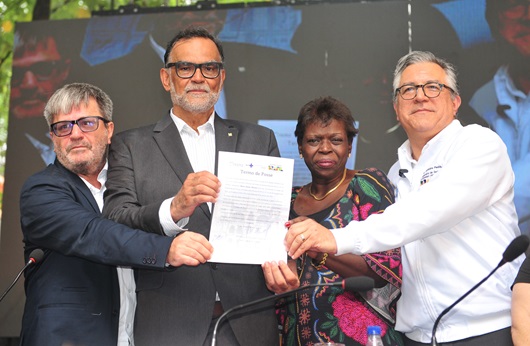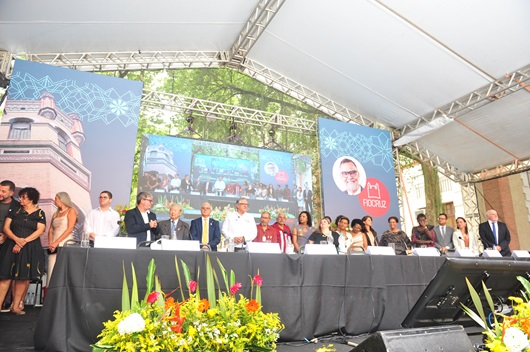Re-elected president of Fiocruz, Mario Moreira took office on April 4th for another four years. Re-elected on October 24th for the 2025-2028 term, he received 81.8% of the valid votes. The ceremony was held outdoors at the Pasteur Square, next to the famous Manguinhos Castle in Rio de Janeiro. Mario Moreira, the 28th president of Fiocruz, began his second term with the most diverse ethnic-racial and gender composition in the Foundation's history. Of the top management positions, including vice presidents and coordinators, 64% will be occupied by black people. Women will be in the majority, occupying 7 of the 11 seats. Moreira said that the event was "a celebration of democracy".

In his second term, Mario Moreira is the 28th president of Fiocruz (photo: Peter Ilicciev)
Beginning his speech, Moreira said that the ceremony "represents much more than the inauguration of a president of Fiocruz. It signifies the capacity we have in Brazil to mobilize various sectors of society, who are here in defense of democracy, science, health, and also in uncompromising defense of the [Unified Health System] SUS". He greeted the former presidents present – Carlos Morel, Paulo Buss and Paulo Gadelha – and the other members of the table.
Alluding to a phrase said in a previous speech by Elizabeth Campos, coordinator of the Social Enterprise Network (Rede CCAP), Moreira said that "Fiocruz is not close to the favelas and peripheries. It is the favela and periphery.
The president admitted to being nervous about the emotional days he has been experiencing. "I have received a few honors recently, such as the knighthood of the Belgian crown. But nothing compares to the thrill of being sworn in as president of Fiocruz. And here, at the Pasteur Square, a place of struggle, of reinstatement of dismissed civil servants and so many other mobilizations".
He said that scientists and science have been under persecution in recent times. "The Lula government is the resumption of democracy and the process of social mobilization. Fiocruz suffered during the two governments prior to Lula's. We have to work on rebuilding the country and, in this recovery, Fiocruz has a role and knows what its role is, in science, in health, in training professionals, in technology. It has also taken on an increasingly crucial role on the international stage".
Moreira pointed out that there are major challenges in Brazil. "We have a very unequal country in which part of the population is once again hungry. I hope that during Lula's first term we can return to a time, about ten years ago, when we thought we had overcome this situation once and for all".

Paulo Garrido, Mario Moreira, Elizabeth Ca,pos and Alexandre Padilha hold the term of office (photo: Peter Ilicciev)
The president said that Brazil is the only country that has something like the SUS and that this needs to be valued. "It is a banner of civilization. Every worker here is fully aware of our role. Fiocruz is an asset of Brazilian society, present in all biomes, in several states. We mobilize 11 thousand workers every day, all in activities aimed at the common good".
Moreira cited climate change and the damaging effects of these changes on health. He also commented on the demographic transition the country is going through, whose disease burden has been putting pressure on the SUS.
"Fiocruz is a living, pulsating body that breathes science and exudes care, an organism that grows, that thinks, that reinvents itself and insists on resisting in the face of any scenario, we are driven by the tireless search for knowledge, for nurturing, for the right medicine, for the exact vaccine, for the possible cure".
According to the officer, "every survey here enriches Brazil's destiny. We have a long-term vision and urgency, because our people cannot wait and every discovery is a breath of life for those who are waiting. Science here is not cold, it has human warmth, hands that touch, eyes that observe, and hearts that insist with fearless perseverance. A beacon in the midst of the fog, Fiocruz is the reassurance that, even in times of uncertainty, there are always those who dare to seek answers to society's demands".
He recalled that Fiocruz is a National Asset of Public Health. "This honor was achieved by bill 2077 of 2019, approved in 2021, which was authored by deputies Odorico Monteiro, Alexandre Padilha, Jorge Solla, Alice Portugal, and Totonho Lopes". Moreira emphasized that "the country has been in a democratic process for 40 years and that, during this period, Fiocruz has played a leading role in the construction of the Unified Health System, and we have managed various SUS ideas, expanding its actions throughout the country".
On the difficulties experienced by previous governments, Moreira commented that the country and Fiocruz had lived through "dark times. Mobilized, with our Advisory Board alert, we managed to continue going forward. In the previous government, Brazil, which has 3% of the world's population, had around 10% of the world's deaths from COVID-19, which is unacceptable. History will make amends, but it is also up to the Courts".

Mario Moreira presents the new composition of his presidency (photo: Peter Ilicciev)
Moreira asked what kind of science Fiocruz is doing, with whom and for whom. "This has to be an institutional principle. We need to do (and talk) to those who will benefit. In a month's time we will celebrate 125 years, a quarter of National history, and the creation of Fiocruz is intertwined with the formation of the Brazilian republic. Fiocruz has its feet firmly planted in tradition but its eyes set on the future. And with permanent dialog with society".
According to Moreira, "the SUS is one of Brazil's greatest achievements and arouses interest in other countries, even developed countries. We have a lot to teach. Today, you cannot deal with national health without thinking about global health, as borders have collapsed".
He said that the Foundation wants to play an increasingly effective role in the field of vaccines, which are a public good and cannot be the object of greed and profit. "We have also made progress in various areas, such as women's health, socially determined diseases, rare diseases, and cancer therapies. I hereby declare my commitment to public policies, with which Fiocruz is fully engaged".
As to the explosive issue of public security, Moreira noted that the issue has affected health, especially in the peripheries. "The area around the Foundation has suffered as a result. This issue affects the mental health of communities and workers".
The president said that his biggest challenge is to consolidate Fiocruz as a strategic institution of the Brazilian state. "We are going to sign an agreement with the Ministry of Health, the Federal Attorney's Office, and the Ministry of Innovation and Management to help this unique institution, which has a museum, school, hospitals, laboratories of all kinds, factories, etc. Fiocruz was the biggest public industrial power in the pharmaceutical sector during the pandemic. Together with Butantan, we have saved thousands of lives".
According to him, there are all sorts of challenges. "There are 11 thousand workers. Of these, only 4 thousand are civil servants and 7 thousand are outsourced workers with precarious contracts. I am going to put my heart and soul into this issue and I ask the parliamentarians present to help us with it in Congress."
Moreira then announced the composition of the new presidency and called the vice presidents and coordinators to the stage. Rivaldo Venâncio will act as Chief of Staff. The vice presidents will be Valcler Rangel (Environment, Health Care, and Promotion); Marly Cruz (Education, Information, and Communication); and Alda Cruz (Research and Biological Collections). Marco Krieger remains in charge of the Health Production and Innovation Vice Presidency, and Lourdes Oliveira will be leading a new Vice Presidency, that of Global Health.
Juliano Lima continues as CEO, with the support of deputy CEO Priscila Ferraz. As coordinators, Tania Fonseca (Health Surveillance and Reference Laboratories) and Hilda Gomes (Equity, Diversity, Inclusion, and Affirmative Policies) remain in office. Zélia Profeta will be coordinator of Institutional Relations, and Rômulo Paes, of the Center for Strategic Studies. Raquel Aguiar will be in charge of the Social Communication Coordination. Fabiana Damásio remains as the coordinator of Fiocruz Brasília.
Finally, the president greeted the members of his first term who are moving on and thanked the relatives present. Moreira also asked for a round of applause for all the workers at Fiocruz: "the dedication, commitment, and engagement of everyone is impressive, transforming their work into a life mission, and this is what ensures what we are doing and delivering to Brazilian society. He closed by evoking the actress Fernanda Torres, saying that "life is good".
Former Minister of Health and former president of Fiocruz Nísia Trindade Lima was unable to attend and sent a letter to Mario Moreira. As the person responsible for concluding the ceremony, the Minister of Health, Alexandre Padilha, began his speech by highlighting Fiocruz's strategic role in the SUS and in the country's development. "The pillar that made this institution what it is was its body of researchers, its capacity for professional training and its ability to systematize a large part of public health while thinking in the country – as well as its ability to count on workers who have sustained the institution".
In this context, Padilha praised the work carried out by the Foundation during the pandemic, which "generated greater recognition in Brazilian society about what Fiocruz is." According to him, "science has been taken to a level of political discussion and the country's development agenda like never before. This triad of valuing science, valuing the SUS, and recognizing what Fiocruz is opens up a huge political, institutional, and cultural opportunity. This government wants to support Fiocruz's dreams."
At the end of his speech, the Minister emphasized the need to reorganize the global scientific, technological, and supply production chains in relation to health in the post-pandemic period. "Let us take advantage of the potential we have to be part of this reorganization of global chains. We have a lot of pride and identity in what Fiocruz means in our history."
"The Ministry of Health and Fiocruz will be fundamental barriers against denialism. This is our historic mission. We trust and believe in Fiocruz and we will support the institution in building these dreams", he concluded.
Investiture ceremony
Seven other authorities took part in the investiture ceremony. André de Paiva Oliveira da Silva, officer at the Marielle Franco Polytechnic Guild at the Joaquim Venâncio Polytechnic School (EPSJV/Fiocruz), highlighted Mario Moreira's attentive and sensitive approach to the importance of student representation at the Foundation. "Today we celebrate not only the continuity of an administration, but the strengthening of a commitment to science, education, and public health in this country [...] By recognizing the need to give students a voice, Mario inspires and mobilizes each of us to fulfill our mission of serving the Brazilian population. Fiocruz, as a reference institution, doesn't just teach – it transforms lives", he added.
The founder of the Espaço Casa Viva project and coordinator of the Social Enterprise Network (Redeccap in Manguinhos), Elizabeth Campos, emphasized the importance of a dialogical relationship and the exchange of knowledge as a key part of democracy. “The struggle of this house, connected to the struggle for health, education, and access to rights, must continue in the production of active knowledge for the construction of a more united society and healthier territories [...] Congratulations to President Mario and may Fiocruz continue to dare, researching efficiently and effectively in the territories.”
The result of a collective effort to preserve the values that sustain the Foundation, the strength of the democratic management built at Fiocruz was highlighted by the president of the Fiocruz Workers' Union (Asfoc-SN), Paulo Garrido. "We need leaders like Mario Moreira and his team – competent, calm, and combative. Fiocruz has a great history, but it is only kept alive because we are so many workers united by a greater purpose: serving the Brazilian population", he said. "This is the moment to strengthen our internal unity and reaffirm our commitment to the Brazilian population [...] May this cycle be marked by concrete progress for all of us", he added.
The accelerated progress made in science gained ground in the speech by the former president of Fiocruz between 1989 and 1990, Akira Homma. "These accelerating changes bring enormous challenges for the century-old institution and will require new management and governance strategies to serve our SUS [...] Mario has the challenge of leading Fiocruz through these new times with the wisdom and sensitivity that has been his hallmark. All of us will certainly be showing our pride in being Fiocruz", he concluded.
The director of Fiocruz Bahia, Marilda de Souza Gonçalves, represented the Foundation's Decision-making Body. She recalled Mario Moreira's professional career and emphasized Fiocruz's work in its various areas of activity, such as vaccine and drug production and academic and human resources training, as well as its commitment to the Unified Health System (SUS), the 2030 Agenda, and to tackling climate change. "Today, the Fiocruz community takes office together with you, as we validate your permanence in the Presidency of our Institution. We are making a commitment to support him and to ensure that his management of our Fiocruz is always successful, sensitive, equitable, and fair".
In her speech, the president of the National Health Council (CNS), Fernanda Magano, emphasized Fiocruz's legacy for Brazilian public health and the partnership in CNS initiatives with the institution in the fields of social control and academia. She cited the Foundation's important role during the COVID-19 pandemic. "Social control's commitment to defending the health of this country is also in defense of this important institution, Fiocruz, and we wish Mario Moreira a term of excellence, doing what he has already been doing".
The representative of the Pan American Health Organization (PAHO/WHO) in Brazil, Cristian Morales, greeted President Mario Moreira and highlighted the long-standing joint work between the United Nations agency and the Foundation. He also highlighted Fiocruz's role in tackling health challenges, such as the COVID-19 pandemic, and in seeking equity in global access to supplies. "His (Moreira's) leadership has been fundamental in strengthening Fiocruz's role as a reference for our region and the world in public health, education, science, and innovation", said Morales. "Fiocruz is a key partner in the Americas. Looking at the future, the challenges demand urgent answers and Fiocruz's ability to generate strategic knowledge, formulate, and execute public policies and drive economic, social, and environmental development make it a key player for a region that wants to advance in the productive sovereignty of public health and in human and sustainable development".
In attendance were federal deputies Talíria Petrone (Psol-RJ), Dimas Gadelha (PT-RJ), Marcelo Queiroz (PP-RJ), and Jandira Feghali (PCdoB-RJ); and state deputies Renata Souza (Psol), Flávio Serafini (Psol), and Elika Takimoto (PT).
The event was followed by the launch of the guide Health on the Table: healthy and artisanal food services for events [Saúde na Mesa: serviços de alimentação saudável e artesanal para eventos]. The Health on the Table banquet was offered to the hundreds of participants in the inauguration, with around 80 recipes prepared by 20 groups mapped in the catalog.


